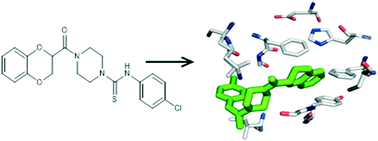当前位置:
X-MOL 学术
›
RSC Med. Chem.
›
论文详情
Our official English website, www.x-mol.net, welcomes your feedback! (Note: you will need to create a separate account there.)
Development of piperazine-1-carbothioamide chitosan silver nanoparticles (P1C-Tit*CAgNPs) as a promising anti-inflammatory candidate: a molecular docking validation†
RSC Medicinal Chemistry ( IF 4.1 ) Pub Date : 2018-04-04 00:00:00 , DOI: 10.1039/c7md00628d C S Karthik 1 , H M Manukumar 1, 2 , S Sandeep 1 , B L Sudarshan 3 , S Nagashree 1 , L Mallesha 4 , K P Rakesh 5 , K R Sanjay 3 , P Mallu 1 , Hua-Li Qin 5
RSC Medicinal Chemistry ( IF 4.1 ) Pub Date : 2018-04-04 00:00:00 , DOI: 10.1039/c7md00628d C S Karthik 1 , H M Manukumar 1, 2 , S Sandeep 1 , B L Sudarshan 3 , S Nagashree 1 , L Mallesha 4 , K P Rakesh 5 , K R Sanjay 3 , P Mallu 1 , Hua-Li Qin 5
Affiliation

|
Natural products are important leads in drug discovery. The search for effective plant-derived agents or their synthetic analogues has continued to be of interest to biologists and chemists for a long time. Herein, we have synthesized a novel compound, P1C, and P1C-Tit*CAgNPs from chitosan; P1C is a precursor and an anti-inflammatory candidate, which has been validated by molecular docking studies. The synthesized P1C-Tit*CAgNPs showed monodisperse, spherical, and cationic nature and antioxidant properties, protecting destabilization of the erythrocyte membrane by the azo compound 2,2′-azobis(2-amidinopropane)dihydrochloride (AAPH); the involvement of NPs as a protective agent for biomolecules, such as DNA and protein, followed by the treatment of NPs with AAPH was confirmed. The inhibition of cellular damage and leakage of cellular inflammatory agents was confirmed by AFM, SEM, TEM, SDS-PAGE, LDH, and PLA2 enzyme inhibition via in vitro studies. The anti-inflammatory property of P1C was further validated by in silico molecular docking studies and showed that, the P1C best pose aligned to PLA2 compared to standard drug. The significant anticancer property of P1C-Tit*CAgNPs was confirmed against MCF7, U373, and C6 cancer cell lines. Thus, the present study highlights the synthesized P1C in P1C-Tit*CAgNPs as a target PLA2-specific anti-inflammatory candidate, and further tuning of small and development-functionalized nanoparticles has a great future in medicine; hence, their clinical applications are warranted.
中文翻译:

开发哌嗪-1-硫代硫酰胺壳聚糖银纳米粒子 (P1C-Tit*CAgNPs) 作为有前途的抗炎候选物:分子对接验证†
天然产物是药物发现的重要线索。长期以来,寻找有效的植物衍生剂或其合成类似物一直是生物学家和化学家的兴趣所在。在此,我们从壳聚糖合成了一种新化合物 P1C 和 P1C-Tit*CAgNPs;P1C 是一种前体和抗炎候选药物,已通过分子对接研究得到验证。合成的 P1C-Tit*CAgNPs 具有单分散、球形和阳离子性质和抗氧化特性,可保护偶氮化合物 2,2'-偶氮二(2-脒基丙烷)二盐酸盐 (AAPH) 对红细胞膜的失稳作用;确认了 NPs 作为生物分子(如 DNA 和蛋白质)的保护剂,随后用 AAPH 处理 NPs。通过体外研究。P1C 的抗炎特性通过计算机分子对接研究得到进一步验证,并表明与标准药物相比,P1C 与 PLA2 的最佳姿势一致。P1C-Tit*CAgNPs 对 MCF7、U373 和 C6 癌细胞系具有显着的抗癌特性。因此,本研究强调了在 P1C-Tit*CAgNPs 中合成的 P1C 作为目标 PLA2 特异性抗炎候选物,进一步调整小型和开发功能化的纳米颗粒在医学上具有广阔的前景;因此,它们的临床应用是有保证的。
更新日期:2018-04-04
中文翻译:

开发哌嗪-1-硫代硫酰胺壳聚糖银纳米粒子 (P1C-Tit*CAgNPs) 作为有前途的抗炎候选物:分子对接验证†
天然产物是药物发现的重要线索。长期以来,寻找有效的植物衍生剂或其合成类似物一直是生物学家和化学家的兴趣所在。在此,我们从壳聚糖合成了一种新化合物 P1C 和 P1C-Tit*CAgNPs;P1C 是一种前体和抗炎候选药物,已通过分子对接研究得到验证。合成的 P1C-Tit*CAgNPs 具有单分散、球形和阳离子性质和抗氧化特性,可保护偶氮化合物 2,2'-偶氮二(2-脒基丙烷)二盐酸盐 (AAPH) 对红细胞膜的失稳作用;确认了 NPs 作为生物分子(如 DNA 和蛋白质)的保护剂,随后用 AAPH 处理 NPs。通过体外研究。P1C 的抗炎特性通过计算机分子对接研究得到进一步验证,并表明与标准药物相比,P1C 与 PLA2 的最佳姿势一致。P1C-Tit*CAgNPs 对 MCF7、U373 和 C6 癌细胞系具有显着的抗癌特性。因此,本研究强调了在 P1C-Tit*CAgNPs 中合成的 P1C 作为目标 PLA2 特异性抗炎候选物,进一步调整小型和开发功能化的纳米颗粒在医学上具有广阔的前景;因此,它们的临床应用是有保证的。



























 京公网安备 11010802027423号
京公网安备 11010802027423号